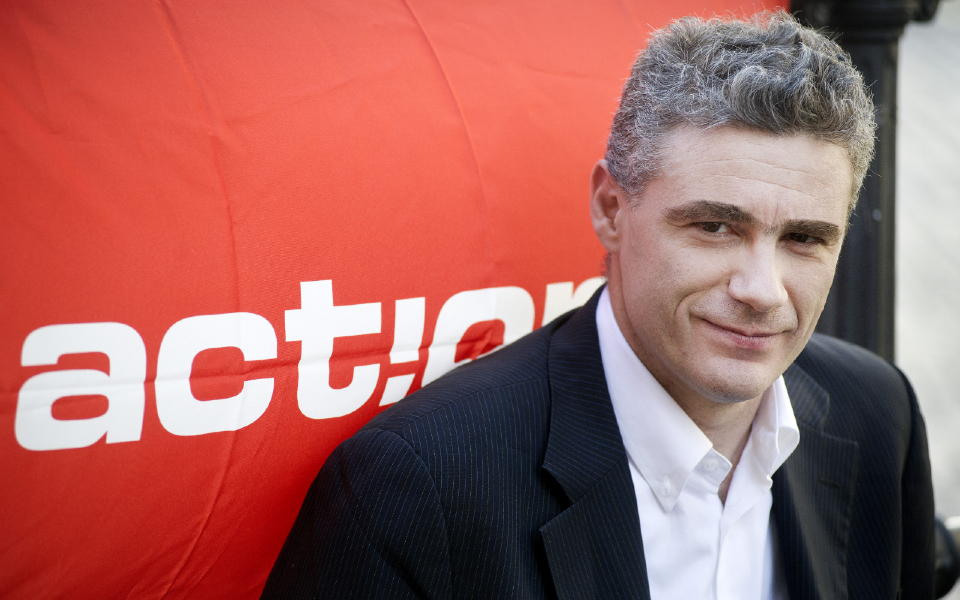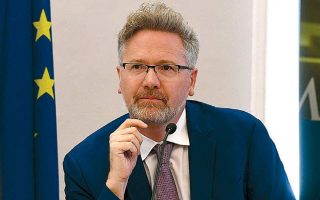Italian ActionAid official: ‘This is the time to show that the European project is alive’

Impose strict containment measures while there’s still time. The phrase sums up the advice to Greece from Marco De Ponte, general secretary of ActionAid Italy. In an interview with Kathimerini, the nongovernmental organization official casts light on the reasons for Italy’s devastating death toll from the novel coronavirus.
What went so terribly wrong in Italy? Can you give us the main reasons for the current tragedy?
I don’t think something went terribly wrong in Italy; a virus is a virus. The only thing is that most of the people in Italy didn’t get tested unless they went to hospital. That was actually a mistake because in the hospitals people get infected from one another. It’s not that the virus is particularly deadly here. The number of people that are seriously sick is more or less like in any other country, but we tested fewer people. People were advised to stay home and the lockdown happened really early. The ratio of the people that seem to be positive and the dead is particularly surprising. Apparently, 8 percent of the people tested are seriously sick; but the reality is that many more people are probably positive, but they are not confirmed cases because they stayed home and maybe some are even asymptomatic. The number of deaths is related to the fact that we were the first country in Europe that faced such a situation and people were still in contact with one another for 15 days before we closed everything down.
Do you see a lack of European solidarity toward Italy, with China and Russia stepping in to fill the void?
European solidarity versus global solidarity: That is a very interesting thing. I think it’s interesting that small countries with close ties to Italy, like Albania or Somalia or even Cuba wanted to send medical equipment. That was more of a PR exercise if you like, but nobody was forcing them to do so, so we thank them. China, of course, they had experience, and we all know that China is using support as a diplomatic tool as well, so that is more political. In my opinion, I think that Europe should be carefully watching what China and Russia are doing because you know a divided Europe is probably in the interest of both. Now solidarity at a European level, that is a different thing. It is not about sending medical equipment or things like that; it is about the economic relief that will come later. Socializing the losses is probably something that countries like the Netherlands, Denmark, Germany or Finland are not prepared to do. I think they will come closer to more reasonable positions soon, because even as I sit talking with colleagues, they still do not perceive the threat. So maybe a week down the line they will understand. Who is the Netherlands going to trade with if Italy, Spain and France for example – the three largest economies apart from Germany in the European Union – have contracted 10 percent?
So it is a matter of solidarity, but it is also about being smart. This is the time to show that the European project is alive, or it will crumble just like everyone is saying may happen. But it is also the moment to acknowledge that it is in everyone’s interest to act quickly.
What is ActionAid doing in the battle against Covid-19?
In Italy we are basically doing three things. At the broad policy level we are looking at economic emergency measures, particularly trying to broaden existing economic measures that address the needs of the poorest part of the population. We have something called citizenship revenue and we are trying to extend that because we know the number of poor people will increase. Secondly, together with other organizations, we are looking into measures that the state could take to protect the economic sector – this is more of a kind of union work. Thirdly, we are continuing existing programs, focusing on issues that we deal with normally. One is attention to the migrants. The migrant community in Italy is 700,000 people who are just out of the system, like irregular workers. These people are also a ticking time bomb for public health – if you want – because they are not acknowledged by the state, they cannot go to hospital. So what we are saying is that they should be regularized. We are also continuing and deepening our work in relation with women who are victims of violence. We have actually worked on a European level to support so-called “anti-violence centers” where women who are victims of violence can find shelter. Shelters cannot operate during the quarantine, so we are trying to ensure that the victims get to the anti-violence center first of all, that these structures get the economic support to sustain their operation and we are advising the government on how to take care of these people.
What is the main lesson from this crisis? Is there something we Greeks should avoid? Also, is there something we could do to help the Italians?
They should avoid anything that will slow down the reaction. Greece is actually a smaller country, so introduce harder measures faster if you can, as a state, and, as citizens, don’t break the rules, nobody is going to be smarter if they think they can get away with this. So, take it seriously. That is the responsibility of individual citizens, no matter what the state instructs you to do.
In terms of what the Greek government can do, I think that, in the European context, it should probably push together with France, Spain and Italy to make sure that common EU resources are mobilized, not counting 3 cents there, 3 cents here, but really enabling the countries that are worst hit to react quickly, because if the economy can restart, it will be in the interest of everyone in Europe. If it doesn’t restart because this is a symmetric crisis, it will even bring down those who are trying to save their money now. This is not like what happened in Greece before, one state in a crisis, where the rest of the world can hope not to be touched, but it’s a symmetric crisis where we either march on together or fall together, no matter who is spending money first and who is toughest in the short run. Because even if a country doesn’t get hit directly, it will be hit indirectly by the economic effect of the whole thing. So, we hope Greece can convince other countries to share the burden in the EU negotiations.





